新概念青少版2B Unit23
新概念英语青少版2A unit 23
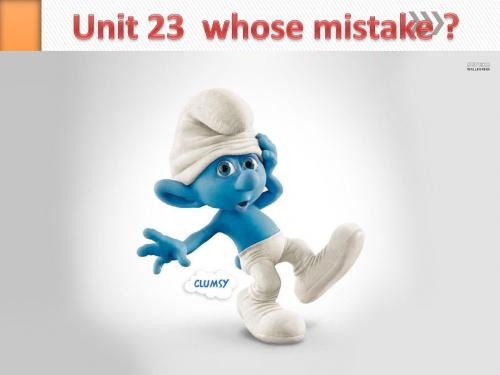
» 2. can / could的用法 » (1)can表示推测“可能性”时,往往用于否定句或疑问句。 Can`t“一定不”,can在疑问句中意思是“会、可能”。 » He can`t be at home. = It is impossible that he is at home. » 他一定不在家。 » (2)can /can`t+ have done,表示对过去发生的动作进行推测。 » He can`t have gone to Shanghai for I saw him a minute ago. » 他不可能去了上海,我刚才还看见他。 » It`s so late. Where can she have gone? 天晚了,她可能去哪儿了 呢? » (3)could 还可以用于表示客气、委婉、礼貌的请求语气。 » Excuse me, could you tell me the way to the bus station? Could you help me? » (4)could have done » 本能做但未做,表虚拟语气 » I could have done it well,but I wasn’t so careful then .
»The judges insisted it hadn’t been a mistake. They liked the base on its own, but they the head was awful.
» insist: 此处insist后省略了 that » on one’s own:靠自己的力量,独自地; 独力; 独 立 » 这些课程他是自学的。 » He studied these subjects on his own. » awful: [ˈ adj.糟糕的 极坏的 adv.非常 ɔ:fl] » 联想: awesome ['ɔ:səm] adj.令人敬畏的
新概念英语青少版 2b Unit 23
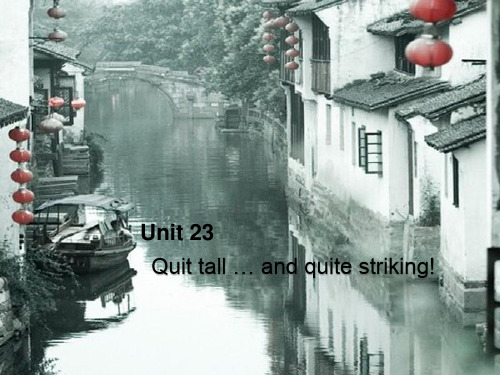
one
special = a/any/no special person 一个/任何/没有特别的人
Lesson 45
height eg. What is your height?
high adj. tall 用于形容人或物的高度,
表示比同类的其他人或者 其他事物相对要高 high 用于形容某物的高度, 指的是它的绝对高度,如 从地面算起的高度,a high window,或者从海平面算 起的高度,a high mountain,或者用在抽象 短语里表示比正常要高, high excitement, high hope
1.Quite tall——quite = moderately, fairly 是最常用的程度 副词。表示非常与very 相似:quite tired;quite old;quite striking等。
在这些搭配中,quite的意思是“低于最高程度”。 有些性质是绝对的状况,表达这种状况的形容词是不可 分等级的:如,dead , impossible, pregnant , unique…
Lesson 45
face n. a round face 一张圆脸 face to face 面对面地 face v. 面对 eg. He is facing many problems this winter.
Lesson 45
file copy the file 复制文件 move a file 移动文件 a computer file 计算机文 件
striking= noticeably goodlooking
e.g.She’s quite striking.
Lesson 45
send send sb. sth=send sth. to sb.把某物送给某人 eg: My mother sends me a card.
新概念英语青少版2B_unit_23

句型练习
就下列句子的划线部分提问:
1)It’s about 50 kilometres from my house to the park.
How far is it from your house to the park?
2)She is about five foot tall.
How tall is she?
长度 length [leŋθ] 邮包,包裹 parcel ['pɑ:sl] kilo ['ki:ləu ] 千克,公斤
末端,终点
end [end]
Listening and understanding
• How tall is Sandy? • She is one metre eight-two.
Try to say these words
…有多远? 任何人
How far…?
高,高度 height [hait]
anyone ['eniwʌn]
英尺
foot
看一看
[fut] have a look
Try to say these words
较晚地,后来
la['senti,mi:tə] building ['bildiŋ] 建筑物
2.Is it about 95 miles from Daisy’s house? No,it isn’t.It’s about 45 miles. 3.Will Daisy have the pictures by 12 o’clock? No,she won’t.She will have the pictures by two o’clock.
foot
later centimetre
新概念英语青少版b unit23
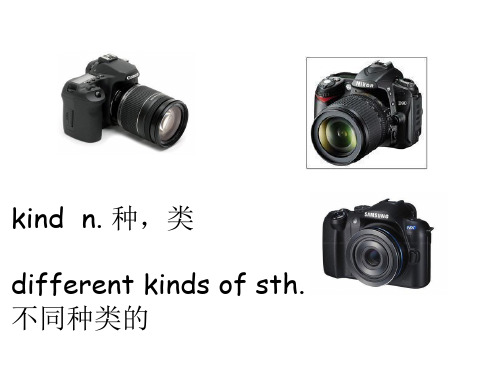
7. Claire wants a new mobile for her birthday. F
句型重点
本课练习的是 (1)第三人称的he/she has got…用法 (2)单数可数名词和 a Japanese one, an
Italian one中one的用法 。 (3)练习动词want的单数第三人称用法:
kind n. 种,类
different kinds of sth. 不同种类的
Let me think 让我想想
Japanese adj. 日本的
明白了!
I know! 我知道了!remember to do 记得要做
I see!
某事;记得去做某事
remember doing 记着已 经做过的事
another (三者以上的)另一个
eg:I have eaten some apples. Could you give me another apple?
some apples
another apple
birthday n. 生日 birth n. 出生 起源
like v. 喜欢 Do you like it?
handbag n. 手提 包
clock n. 钟
watch n. 手表
Swiss adj. 瑞士的 n. 瑞士人
Switzerland n. 瑞士
• What kind of .... • kind此处表示种类,类
型,for example:
• What kind of Camera has she got?
的
William: She can give me the old one at any time! Just bring it here.
新概念英语青少版b unit23
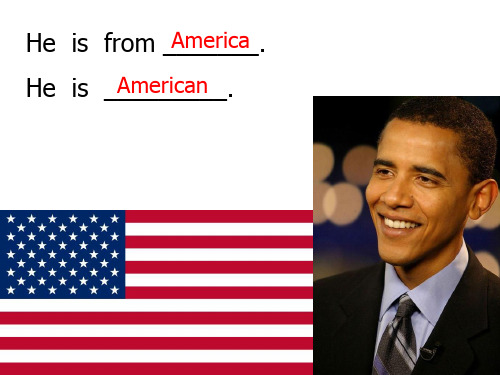
40
• 4..Whose old camera is Claire’s camera ?
It’s Daisy’s old camera.
• 5.When does she want a new camera?
At her birthday.
• 6.Who can she give the old one derstanding
One of +名词复数cameras, 相机中的一个
• Jack: It’s one of Daisy’s old cameras. Claire wants a new one for her birthday.
For是介词,表 达原因和目的
7/27/2020
6
She is from F_r_a_nc_e___. She is _F_re_n_c_h____.[frentʃ]
7/27/2020
7
She is from _J_a_p_a_n_. She is _Ja_p_a_n_e_se_. [.dʒæpə'ni:z]
7/27/2020
4
Korea [kə'ri:ə]
Nationality: Korean
She is from _______ She is ___________
7/27/2020
5
Sweden[ˈswi:dn]瑞士
Nationality: Swiss[swis]
He is from ______
He is _________
25
1.Claire has got a camera. T 2. Claire has got an English camera . F 3. Jack can remember the name of the camera. F 4. It is a Canon Ixus. T 5.It is a cheap camera. F 6. Claire doesn’t like the camera. F 7. Claire wants another one. T 8. It is one of Jack’s old cameras. F 9. Claire wants a new mobile for her birthday. F
青少版新概念2B课后习题答案
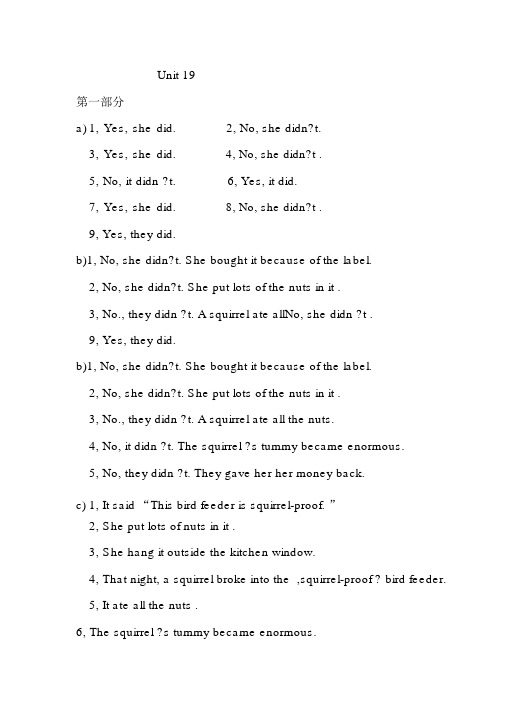
Unit 19第一部分a)1, Yes, she did.3, Yes, she did.5, No, it didn ?t.7, Yes, she did.9, Yes, they did. 2, No, she didn?t. 4, No, she didn?t . 6, Yes, it did.8, No, she didn?t .b)1, No, she didn?t. She bought it because of the label.2, No, she didn?t. She put lots of the nuts in it .3, No., they didn ?t. A squirrel ate allNo, she didn ?t .9, Yes, they did.b)1, No, she didn?t. She bought it because of the label.2, No, she didn?t. She put lots of the nuts in it .3, No., they didn ?t. A squirrel ate all the nuts.4, No, it didn ?t. The squirrel ?s tummy became enormous.5, No, they didn ?t. They gave her her money back.c)1, It said “This bird feeder is squirrel-proof. ”2, She put lots of nuts in it .3, She hang it outside the kitchen window.4, That night, a squirrel broke into the ,squirrel-proof ? bird feeder.5, It ate all the nuts .6, The squirrel ?s tummy became enormous.7, She cut it down ,and put it in a bag.Then took it back to the shop.8, hey gave her her money back.第二部分1,Did Polly put the nuts in it ? Yes, she did.What did she put put ? The nuts.2, Did the squirrel eat all the nuts ? Yes, it did.What did it eat ? All the nuts .3, Did Polly see a dead squirrel in the bird feeder outside the kitchen window?Yes, she did.What did Polly she in the bird feeder outside the kitchen window?A dead squirrel.Unit 20第一部分a) 1, Yes , she is .2, Yes, she is .3, No, she won?t .4, Yes, she does.5, Yes, she will.6, Yes, she will.7, No, she won?t.8, Yes, she will.b)1, No, she isn?t . She is going to get an ordinary job.2, No, she isn?t. She is a successful model.3,No, she doesn?t. She wants an ordinary life.4, No, she won?t. She will work regular hours.5, No, She will sleep in the same bed every night.6, No, she won?t . She will meet the right man .7, No, they won ?t. They will have an ordinary life.8, No, it won ?t. It will be wonderful.c)1, She wants an ordinary life.2, She will work regular hours.3, She?ll go home in the everning.4, She will cook beautiful meals and she will eat them with her friend.5, She?ll sleep in the same bed every night.6, Maybe ,one day she?ll meet the right man.7, They?ll have an ordinary life together.8, It?ll be wonderful.第二部分1,Is Nina going to get an ordinary job in an office ? Yes, she is .Who is going to get an ordinary job in an office ? Nina is.2, Does Nina want an ordinary life ? Yes, she does.What kind of life does Nina want ? An ordinary life .3, Will Nina cook beautiful meals ? Yes, she will.What kind of meals will Nina cook ? Beautiful meals.4, Will Nina sleep in the same bed every night ? Yes, she will .Where will she sleep ? In the same bed .Unit 21第一部分a)1, Yes, it is .2, Yes, it was .3, Yes , it will .4, Yes, it will .5, No, it won ?t.6, Yes, it will .7, Yes, it will .8, Yes, it will .b) 1, No, it wasn ?t. Last month was unusually cold and dry.2, No, it won ?t. From today, the wind will blow from the south west.3, No, it won ?t. It will bring in warm air.4, No, it won ?t. Rain will come in gradually from the south west.5, No, it won ?t. The whole country will have some rain showers.6, No, it won ?t . Temperature will rise to 12 degrees Celsius in the day.7, No, it won ?t. It will feel cold over the hills.8, No, we don ?t . We hear the lookout for next weekend .c)1, Last month was unusually cold and dry.2, The wind will blow from the south west.3, It will bring in warm air from the Atlantic.4, Rain will come in gradually from the south west this evening.5, The whole country will have some rain showers.6,Temperature will rise to 12 degrees Celsius in the day.Night temperatures will fall to 4 degrees Celsius.7, It will feel cold over the hills. 8, They are warm, wet and windy.第二部分1, Will it bring in warm air from the Atlantic? Yes, it will.What will it bring in ? Warm air from the Atlantic.2, Will rain come in gradually from the south west this evening? Yes,it will.What will come in gradually from the south west this evening?Rain.3, Will temperature rise to 12 degrees Celsius in the day? Yes, it will.When Will temperature rise to 12 degrees Celsius ? In the day .4, Will the outlook for next weekend be warm, wet and windy?Yes, it will. What will the outlook for the next weekend be ? Wet, warm and windy.Unit 22第一部分a)1, Yes, there will .2, Yes, it will.3, Yes, there will.4, No, there won ?t.5, Yes, they will.6, Yes, it will.7, Yes, it will.8, Yes, he will .b)1, No, there won ?t. There will be another dance next Friday night.2, No, there won ?t. There will be some French students at the dance.3, No. it won ?t. It will start at half past 7.4, No, it won ?t. It will last for two and a half hours .5, No, it won ?t . Karen will take Lucy there.6, No, she needn?t . She must be at the school gates at 10 o?clock sharp.c)1, There was a dance at school last month .2, There will be another dance next Friday night.3, There will be some French students and our teachers at the dance. 4, There won?t be any outsiders .5, It will start at half past 7.6, It will last for two and a half hours.7, Karen will take Lucy there.8, William will take her up .9, She must be at the school gates at 10 o?clock sharp.10, Lucy will behave herself .11, Lucy always behaves herself.第二部分1,Will it start at half past 7 ? Yes, it will.When will it start ? At half past 7 .2, Will it last for two and a half hours ?Yes, it will.How long will it last ?For two and a half hours.3, Will Lucy ?s mother take her there? Yes, she will .Who will take her there ? Lucy ?s mother.4, Must Lucy be at school gates at 10 o ?clock sharp ? Yes, she must.When must she be at school gates ? At 10 o?clock.Unit 23第一部分a)1, Yes, she will. 3, Yes, she will . 5, Yes, she is . 7, Yes, she is.2, Yes, it is .4, Yes, they are . 6, Yes, she is .b)1, No, she won?t. She will send a messenger.2, No, it isn ?t . It is about 45miles from Daisy ?s house.3, No, she won?t. She will have the pictures by 2 o ?clock.4, No, she isn?t. She is very tall.5, No, she isn?t. She is one metre eight-two.6, No, it isn ?t . It ?s about five foot eleven.7, No, she won?t.Daisy will call Cleo tomorrow.c)1, Daisy?s house from Cleo?s office is about 45miles.2, She will have the pictures by 2 o ?clock.3, All the girls are quite tall .4, She is one metre eight-two.5, Cleo will send the file now.6, Daisy will call Cleo tomorrow.第二部分1,Is Daisy ?s house 45 miles from Cleo ?s office ? Yes, it is .How far is Daisy ?s house from Cleo?s office ? 45 miles. 2, Are all the girls young ? Yes, they are .What are all the girls like ? They are very young.3, Is Sandy one metre eight-two ? Yes, she is .How tall is Sandy ? One metre eight-two.4, Is Sandy striking ? Yes, she is .What is Sandy like ? She is striking.。
新概念青少版_2B_unit_23
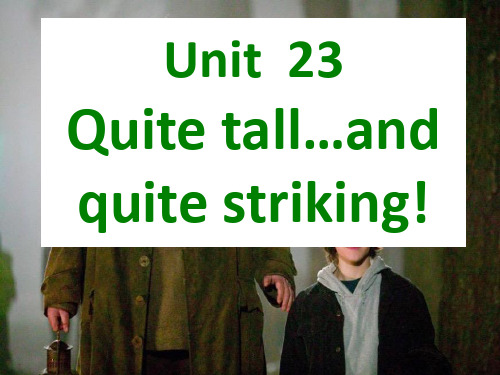
striking send face file
anyone height
foot later centimetre
striking
['straikiŋ]
adj. 极为漂亮的,引人注目的
She’s quite striking.
quite [kwait] adv.相当
send
v.送,寄,派
The owl is sending letters.
That’s quite deep!
long
长的
length
[leŋθ] 长度
How long is that ladder?
What’s the length of that ladder?
parcel
['pɑ:sl]
n.邮包
heavy weight
重的 [weit] n.重量
What’s the weight of this parcel?
从伦敦到纽约有多远?
How far is it from London to New York?
从这到你家有多远?
How far is it from here to your house? How far is it to your house from here ? It’s about 45 miles.
messenger.
名词 n. [C]送信人;使者;(电报,邮件的) 信差,邮递员
I sent the letter by a messenger.
Pic. 2
• Celo: How far is it to your house
from here?
时间副词 ( “大
新概念青少版2BUnit 23 Quite tall--- and quite striking!

Unit 23 Quite tall--- and quite striking!一:Teaching aims:1.how tall/high/wide/deep/long/heavy is that---?2.What’s the height/width/depth/length/weight of that?3.It’s 320 meters. It’s 320 metres wide. It’s 320 metres deep4.How far is it from A to B? It’s near/quite a long way./ it is’t far. It’s a long way. It’s 320 miles.5.Pay attention to the usage of quite/about/very and so on.6.Put a high value on the transformation of statements,simple questions,and Wh-questions.二:Teaching procedures and strategies.1.how 后面通常加形容词和副词,而what 后面则加名词。
例如:How beautifu l the flower is!= what a beautiful flower! (it is) How fast he runs! 试着用what和how翻译:多么热的夏夜!_________________________________ !____________________________________ !How tall is sth= what height is sth2.常见的程度副词quite、very 和about。
如quite tired, quite old, quite ill, quite striking。
新概念二第23课课文
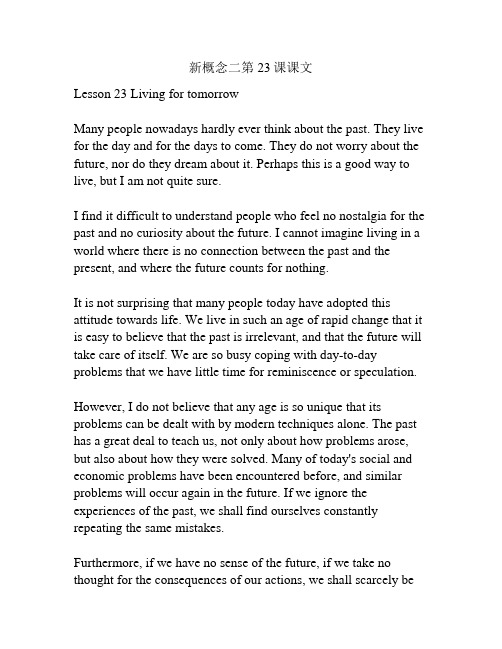
新概念二第23课课文Lesson 23 Living for tomorrowMany people nowadays hardly ever think about the past. They live for the day and for the days to come. They do not worry about the future, nor do they dream about it. Perhaps this is a good way to live, but I am not quite sure.I find it difficult to understand people who feel no nostalgia for the past and no curiosity about the future. I cannot imagine living in a world where there is no connection between the past and the present, and where the future counts for nothing.It is not surprising that many people today have adopted this attitude towards life. We live in such an age of rapid change that it is easy to believe that the past is irrelevant, and that the future will take care of itself. We are so busy coping with day-to-day problems that we have little time for reminiscence or speculation.However, I do not believe that any age is so unique that its problems can be dealt with by modern techniques alone. The past has a great deal to teach us, not only about how problems arose, but also about how they were solved. Many of today's social and economic problems have been encountered before, and similar problems will occur again in the future. If we ignore the experiences of the past, we shall find ourselves constantly repeating the same mistakes.Furthermore, if we have no sense of the future, if we take no thought for the consequences of our actions, we shall scarcely behuman. The ability to plan for tomorrow, to make provision for the future, is one of the basic characteristics of human beings. If we lose this ability, we shall lose our humanity.There is nothing wrong in living for today, provided we do not forget tomorrow. The past and the future are important, but the present is even more important. Indeed, we shall find it hard to cope with today's problems unless we take account of yesterday's mistakes and tomorrow's aspirations. We should never forget that yesterday's dreams are tomorrow's realities.。
青少版新概念2Bunit23

目 录
• 课文学习 • 听力训练 • 口语训练 • 阅读理解 • 写作训练
01
课文学习
课文内容理解
总结词
理解课文主题和主要内容
详细描述
本单元的课文主要围绕“旅行”这一主题展开,介绍了不同国家和城市的特色 和旅游景点。通过阅读课文,学生需要理解文章的主题和主要内容,了解不同 国家和城市的旅游文化。
老师对学生的角色扮演进行点 评和指导,指出优点和需要改 进的地方。
总结与反思
学生总结角色扮演的经验和教 训,反思自己在口语表达方面 的进步和不足,以便进一步提
高口语能力。
04
阅读理解
阅读技巧训练
略读技巧
通过快速浏览全文,了解文章的 大意和结构,有助于把握文章的
核心信息。
寻读技巧
在文章中寻找特定的信息或细节, 如时间、地点、人物等,提高阅读 效率。
词汇学习
总结词
掌握课文中的重点词汇和短语
详细描述
本单元的课文涉及许多与旅行相关的词汇和短语,如“旅行社”、“导游”、“ 酒店”、“航班”等。学生需要掌握这些词汇和短语的拼写、发音和意义,并能 够在语境中正确运用。
语法学习
总结词
掌握课文中的语法结构和句型
详细描述
本单元的课文中涉及多种语法结构和句型,如一般现在时、现在进行时、一般过去时等时态的用法,以及并列句、 复合句等句型的运用。学生需要理解这些语法结构和句型的含义和用法,并能够在实际语境中运用。
通过鼓励和肯定,培养学生对写作的 兴趣和信心,让他们在写作中感受到 成就感和快乐。
提高写作表达能力
通过模仿、练习和反思,逐步提高自 己的写作表达能力,使文章更加流畅、 清晰和有说服力。
青少新概念2B+Unit+23--教师版
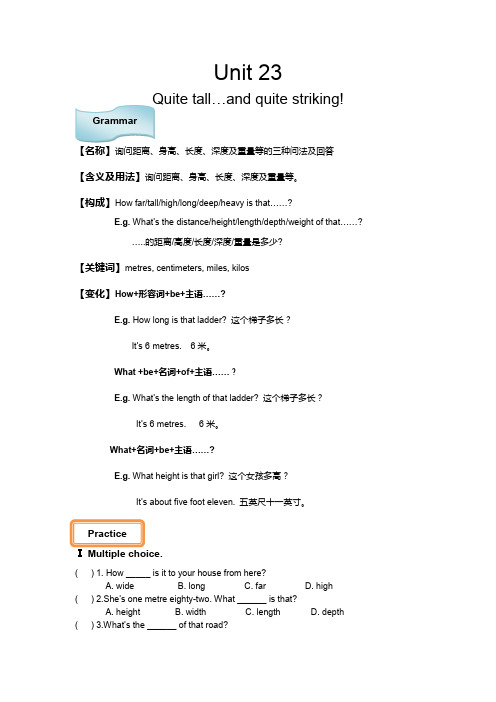
---It’s 30 metres.
A. weight
B. length
C. height
D. depth
( ) 6.---How far is it from London to Beijing?
---It’s a long way. It’s 5,054______.
A. metres
B. miles
E.g. Have a look at this picture, please.请看着这张图片。 5. centimetre 【释义】名词,度量词,厘米。 【辨析】度量词,类似的还有 metre(米),kilometre(千米),minimetre(毫米)。
E.g. 1 kilometre equals to 1000 metres. 一千米等于一千个一米。 6. high 【释义】形容词,高的。
3. foot 【释义】 名词,度量词,英尺。
E.g. It’s about five foot eleven. 大约 5 英尺 11 英寸。 【辨析】意为“脚”时,复数形式是 feet。
E.g. Dinosaurs have big feet. 恐龙的脚很大。 意为“英尺”时,是度量词。英语中得度量词在大于 1 的数字后用复数形式,如 six inches(6 英寸),two metres(2 米)等,但 foot 除外,如 four foot(4 英尺)。
某物送给某人)。
E.g. My mother sent me to the airport yesterday. 昨天我妈妈送我去了机场。 I want to send a thank-you card to my teacher. 我想送一张感谢卡给我的老师。
新概念青少版2B Unit23
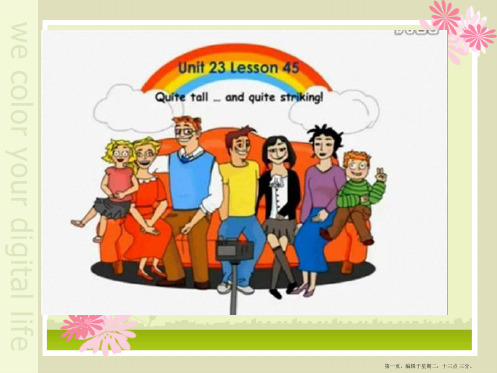
parcel['pɑ:səl]包裹
end[end]终点
第五页,编辑于星期二:十三点 三分。
游戏规则:两组各派一个代表,进行猜拳,老 师挑选出一个单词进行猜拳,其他组员连读该 单词三遍,读完三遍后,两名代表出拳,哪组 猜赢哪组加分。
第六页,编辑于星期二:十三点 三分。
规则:教师说中文,学生说英文或老
第十九页,编辑于星期二:十三点 三分。
第二十页,编辑于星期二:十三点 三分。
get the picture:了解情况
第二十一页,编辑于星期二:十三点 三分。
[ˈspeʃl]
第二十二页,编辑于星期二:十三点 三分。
[ˈsændi]
第二十三页,编辑于星期二:十三点 三分。
第二十四页,编辑于星期二:十三点 三分。
第一页,编辑于星期二:十三点 三分。
第二页,编辑于星期二:十三点 三分。
1. How far is it from here to your house?
2. How do you get here? By bus,by car or on foot?
3. How tall are you?
第三页,编辑于星期二:十三点 三分。
striking ['straikiŋ] 引人注目的 send[send]送 face[feis]脸
]文件 messenger [‘mesindʒə] 信使
How far…?......有多远? anyone[‘eniwʌn]任何人 height [hait] 高度 foot[fut]英尺 have a look看一看 later[‘leitə]稍后 centimetre['sentimi:tə]厘米
Unit 23 Quite tall quite striking! (讲义)新概念英语青少版2B
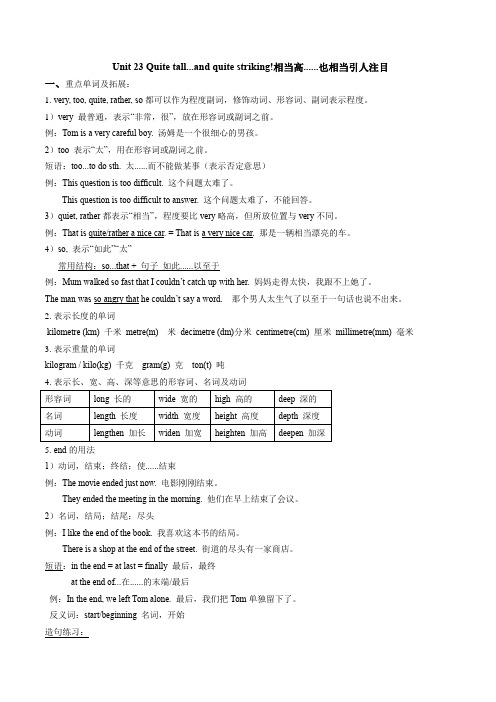
Unit 23 Quite tall...and quite striking!相当高......也相当引人注目一、重点单词及拓展:1.very, too, quite, rather, so都可以作为程度副词,修饰动词、形容词、副词表示程度。
1)very 最普通,表示“非常,很”,放在形容词或副词之前。
例:Tom is a very careful boy. 汤姆是一个很细心的男孩。
2)too 表示“太”,用在形容词或副词之前。
短语:too...to do sth. 太......而不能做某事(表示否定意思)例:This question is too difficult. 这个问题太难了。
This question is too difficult to answer. 这个问题太难了,不能回答。
3)quiet, rather都表示“相当”,程度要比very略高,但所放位置与very不同。
例:That is quite/rather a nice car. = That is a very nice car. 那是一辆相当漂亮的车。
4)so, 表示“如此”“太”常用结构:so...that + 句子如此......以至于例:Mum walked so fast that I couldn’t catch up with her. 妈妈走得太快,我跟不上她了。
The man was so angry that he couldn’t say a word. 那个男人太生气了以至于一句话也说不出来。
2.表示长度的单词kilometre (km) 千米metre(m) 米decimetre (dm)分米centimetre(cm) 厘米millimetre(mm) 毫米3.表示重量的单词kilogram / kilo(kg) 千克gram(g) 克ton(t) 吨4.表示长、宽、高、深等意思的形容词、名词及动词5.end的用法1)动词,结束;终结;使......结束例:The movie ended just now. 电影刚刚结束。
新概念青少版_2B_unit_23(共10页)
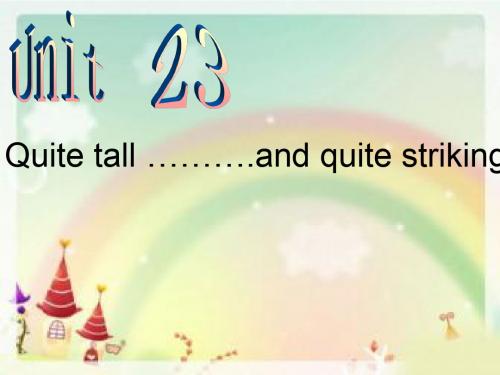
How tall is Sandy? =what is the height of Sandy?
询问高度、长度、宽度、深度、 的方式 How ………is ……. What is ……of …….. 用what问的时候adj变成n形式
题目 Quite tall——quite是最常用的程度副 词。我们用它来降低“可分等级的”形容词 的程度: 如quite tired;quite old;
Quite tall ……….and quite striking
New words
high 高的 adj height 高, 高度 n
wide 宽的 adj width 宽度 宽 n
deep 深的 adj depth 深度 n
long 长的 adj length 长度 n
heavy 重的 adj weight 重量 n
3) 指建筑物的高时用tall或high均可, 可说a tall/ high building。但指一个非常庞大的建筑 物时, 用high,因high在程度上要大于tall。 4) high可作副词,而tall则不能。 ① He jumps high.他跳得很高。不能说He jumps tal 5) tall的反义词是short, high的反义词是low。 ① a short man/tree,不能说a low man/tree。 ② a low building,不能说a short building。
quite ill;qu的 意思是“低于最高程度”。
about 45 miles——about+时间 或度量词,是个程度副词,相当 于“approximately”大约。
1) 说人、动物或树木的主要用tall,而不用high。 应说a tall man/horse/tree (一个高个子男子/一匹高大的马/一棵高大的树), 不能说a high man/horse/tree。 2) 当我们说一个不与地面接触的人和物 的高时要用high,而不用tall。 ① He's high up in the tree.他高高地爬在树上。 ② The kite is so high in the sky. 风筝在空中这么高。 这两句中的high均不能用tall替换。
青少版新概念2a lesson23
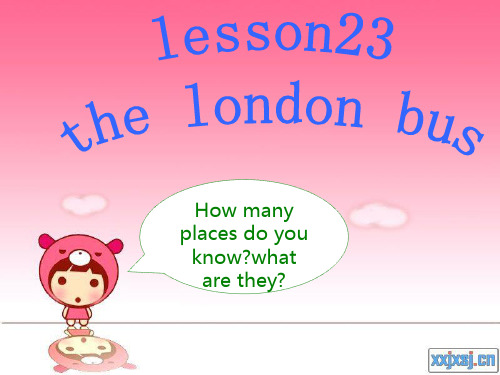
• 1 How long was the Route master the Londoner’s favourite bus? • 2 What was the back of the bus ? • 3 How good were the Routemasters in the London traffic? • 4 What are modern buses like ? • 5 Who hate the doors? • 6 Who hate the buses? • 7 When were the first Routemasters on our roads ? • 8Where and when was the last Routemaster journey?
in the traffic.
Today ,Londoners remember The first Routemasters were the Routemaster’s name. on our roads in 1954. They remember the designer’s The last official name :Douglas Scott. Routemaster journey was on The new buses don’t have a Route Number 9,on 15th name 2006. . Febraury How can we love them?
How many places do you know?what are they?
• countrys:
• China USA UK France Canada • Japan Brazil Korea Italy • Germany Russia Tailand
新概念青少版unit23
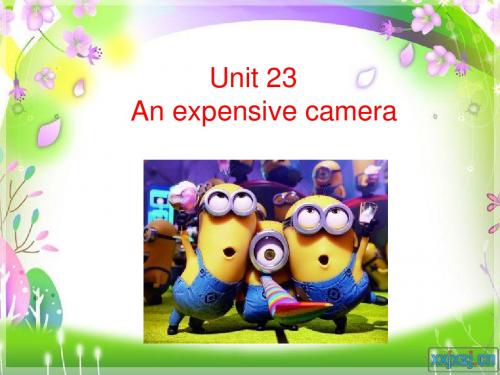
Jis she from?
• She is from Janpa. • She is Janpanese. • • • • • China Chinese America American England English France french Canada Canadian
which one is missing
expensive 昂贵的 kind 种、类 lucky 幸运的
camera
照相机 Japanese 日本的 another 另一个
I know! 我记得 let me think 让我想想 like 喜欢
birthday 生日
at any time 任何时候
Unit 23 An expensive camera
camera
照相机
昂贵的 expensive
感动常在
佳能(Canon),是日本的一家全球领先的生产影 像与信息产品的综合集团 总部位于日本东京,并在美洲、欧洲、亚洲及日本设 有4大区域性销售总部,在世界各地拥有子公司200家, 雇员超过10万人。
remember 记得
kind
种类
让我想想
Let me think what are they doing?
Yes.They are thinking Please remember it.
lucky
幸运的
one apple
another apple
birthday
New words
• • • • • • expensive 昂贵的 camera 照相机 kind 种、类 let me think 让我想想 Japanese 日本的 remember 记得 • • • • • • I know! 我记得 lucky 幸运的 another 另一个 like 喜欢 birthday 生日 at any time 任何时候
青少版新概念unit23
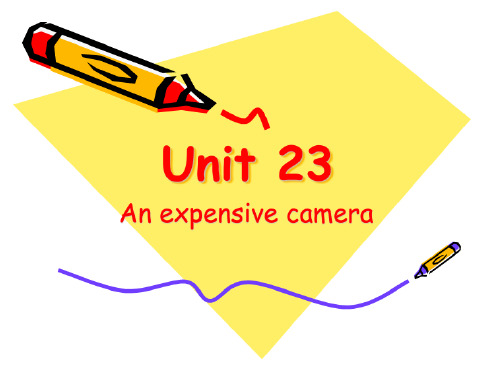
wants是want第三人 称单数形式,动词若是 跟在第三人称后面,要 在后面加s或es
Claire w人称单数疑问句 式,doesn’t=does not, 否定形式的疑问句表 示惊奇,期待对方用yes 来回答
William:Why?Doesn’t she like that one? Jack:Well,she likes it,but she wants a new one.
What kind of……的 种类;哪一种,后面可 加可数名词单数或是 不可数名词
William:What kind of camera has Claire got, Jack? Jack:Let me think.It’s a Japanese one.
Jack:I cann’t remember the name.Oh,yes!I
one of+复数名 词 ….中的一 个
Jack:It’s one of Daisy’s old cameras.Claire wants a new one for her birthday.
give sb. sth. 给某人某物
William:She can give me the old 无论什么时 候,随时 one at any time!Just bring it here!
eleventh twelve thirteen th fourteen th fifteen th twenty thirty twenty-one
twelfth
twentieth thirtieth twenty - first
一 二
三变字体,
th从四上起. 怎么加?真好记!
八加h,九减e
用f代ve,ty变为tie
新概念青少版Unit 23
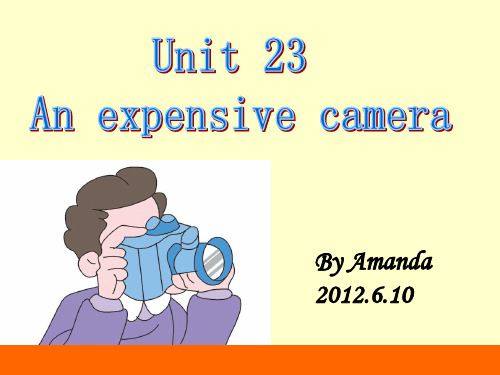
Lucy’s CD player Italian not French
William’s car Korean not American
Annie’s clock Swiss not French
5. A: Have you got a camera?
Guided Summary:
1. Has Claire got an English camera or a Japanese camera? 2. What’s the name of it? 3. Is it a very fine and very expensive camera or not? 4. Does Claire like the camera? Does she want a new one? ( Use…., but…) 5. Is it one of Daisy’s old camera? Does Claire want a new one for her birthday? ( Use…, and…)
B: Yes, I have. It’s a Japanese one.
Claire’s camera Japanese not British
What kind of camera have you got?
A: I’ve got a British one.
பைடு நூலகம்
Lucy’s CD player Italian not French
/eə /
there Claire chair fair downstairs where careful
New words and Expressions:
- 1、下载文档前请自行甄别文档内容的完整性,平台不提供额外的编辑、内容补充、找答案等附加服务。
- 2、"仅部分预览"的文档,不可在线预览部分如存在完整性等问题,可反馈申请退款(可完整预览的文档不适用该条件!)。
- 3、如文档侵犯您的权益,请联系客服反馈,我们会尽快为您处理(人工客服工作时间:9:00-18:30)。
ladder ['læ də] n.梯子
long
长的
length
[leŋθ]
长度
How long is that ladder?
What’s the length of that ladder?
parcel
['pɑ:sl]
n.邮包
heavy weight
重的 [weit]
n.重量
What’s the weight of this parcel?
v.送,寄,派
send sth to sb
寄给某人某物
你能寄给我你的新书吗?
Can you send me your new book? Can you send your new book to me?
messenger
['mesindʒə]
n.送信人
明天我将派一个送信人。 Tomorrow I’ll send a messenger.
从伦敦到纽约有多远?
How far is it from London to New York?
从这到你家有多远?
How far is it from here to your house? How far is it to your house from here ? It’s about 45 miles. 大约45公里。
宽的 wide width [widθБайду номын сангаас n.宽度
This road is 40 metres wide.
That’s quite wide!
deep
深的
depth [depθ] n.深度
This swimming pool is 3,000 metres deep.
That’s quite deep!
Unit 23
Quite tall…and quite striking!
Peggy
striking
['straikiŋ]
adj. 极为漂亮的,引人注目的
She’s quite striking.
quite [kwait] adv.相当
She is sending letters.
send
send sb sth
How far is it from this tower to that peach heart? how far… 有多远
from A to B 从A到B
How far is it from A to B?
从A到B有多远?
从太原到北京有多远?
How far is it from Taiyuan to Beijing?
那是多高?
It’s about five foot eleven(inches). 大约五英尺十一英寸。
What’s this? file
['fail]
n. 文件;档案
我明天下午将送这个文件。
I’ll send this file tomorrow afternoon.
building
n.建筑物
厘米 英尺
英寸
foot inch
How tall am/is/are I/he/she/it/you? 我/他/她/它/你有多高? high height adj.高的 [hait] n.高度
What’s the height of …? ……的高度是多少?
What height is that ?
How high is that building? It’s 320 metres. That’s quite tall.
Mount Everest
珠穆朗玛峰
What’s the height of that mountain? It looks quite high.
It’s quite high . It’s 8,844 metres .
He is one metre ninety. How tall is he? 他一米九零。 He is one hundred and ninety centimetres. 他190厘米。
He is about six foot three inches.
他六英尺三英寸。
How tall is he? metre centimetres 米
It’s 5 kilos.
kilo ['ki:ləu] n.公斤
What’s the weight of this girl?
It’s 60 kilos.
end n.终点
Thank you for listening! I love you!
